I wake up and go straight out for a cold-water swim—the best way to start the day on a trip. It’s a crisp morning with late-August chill and mist rising. Still toasty from the sleeping bag, I plunge before my body clues into the temperature. Jump, breathe, let the body adjust.
Then, blood pumping, adrenaline coursing, I’m temporarily immune to cold. I can climb out and air-dry in the morning breeze, perfectly comfortable, while my family looks on in their puffy jackets, shaking their wool-swaddled heads.
I take in the view of the sky, the morning sun on the white pines, the early rays slicing through the mist, feeling nothing but alive. Later, bundled in warm layers, sitting in my folding chair, cup of coffee in hand, freshly split cedar in a pile, fire crackling cheerily, I couldn’t be happier.
The joy of being uncomfortable
Early on a trip, all the bending, squatting, kneeling, heavy lifting and torquing of the body, hunkering against the rain and wind are a shock to the system. Some people never get past it. But what sets wilderness tripping apart from all-inclusive vacations is the willingness to embrace discomfort as part of the deal.
Paddlers know the sacrifices are worth it. We understand the rewards. We get stronger. We adapt. And we have discovered the secret that against this backdrop of slight inconvenience and discomfort, the mind and body are recalibrated so that the simplest pleasures—being warm, sitting down—are more intense than anything you can experience at a poolside retreat with an all-you-can-drink bar. Touring isn’t masochism—seeking discomfort or suffering for its own sake—so much as a kind of refined hedonism, the path to true comfort and pleasure.
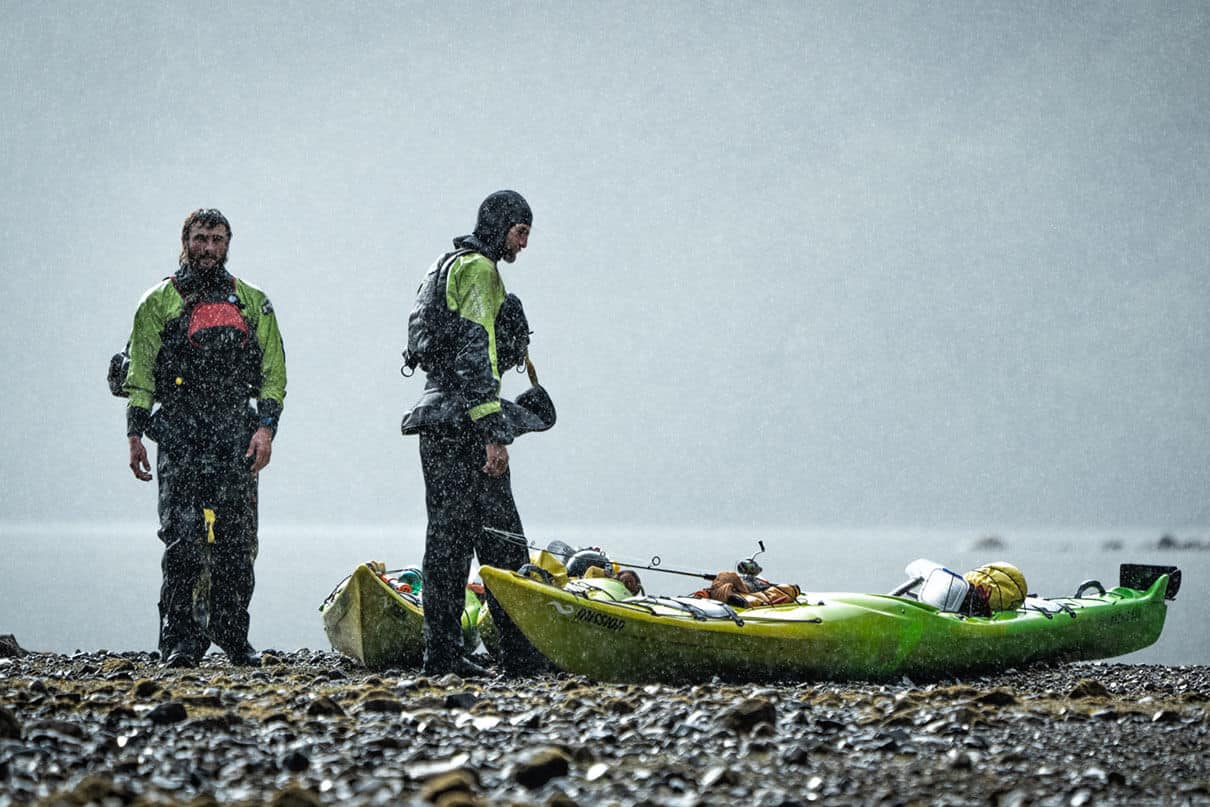
Modern psychology has explained our problem with taking comfort for granted in our everyday lives. In his book The Comfort Crisis, journalist Michael Easter cites a researcher who proved the human brain is wired to find something wrong with every situation. When our big problems are solved, we experience “problem creep” whereby our minds search for something new to fix.
Easter expands this notion to “comfort creep,” whereby “when a new comfort is introduced, we adapt to it and our old comforts become unacceptable. Today’s comfort is tomorrow’s discomfort.” It’s a cycle of dissatisfaction.
I saw a great example of comfort creep recently in a fancy house where the owner showed me a dazzling array of water pipes leading in and out of the furnace room. The purpose was to infinitely circulate heated water in a closed loop so you could get hot water instantly at every tap. I was stunned. How did waiting a few seconds for hot water become so unbearable that someone would re-plumb their entire house instead of appreciating the miracle of hot running water at all?
We’ve engineered comfort into every corner of our lives—heated seats, instant meals, climate control—but we’re still unsatisfied. Instead of embracing simple pleasures, we upgrade, optimize, and consume more, never realizing that the real fix isn’t more—it’s less.
Paddling trips keep comfort creep in check by resetting the goalposts. I think of the Tolstoy character Pierre Bezukhov in War and Peace. Imprisoned in a shed, then forced to march in bare feet, Pierre realizes that his sore, raw feet bother him no more than they did wearing tight dancing shoes in his old life as an aristocrat.
“He had learned that there is a limit to suffering and limit to freedom, and that these limits are not far away; that the person in a bed of roses with one crumpled petal suffered as keenly as he suffered now.”
Not unlike one living in an overly large house with a long hot water delay.
“The roots of pleasure are not to be found in comfort, but in discomfort, because pleasure was a relief from discomfort.”
My kayaking trips are no prison camp, but they do strip life down to essentials in a way that heightens simple pleasures. At home we have the comfort of room temperature, the very concept of which is a recent social construct that, it turns out, may be bad for our health. In a chapter on heating and air conditioning in The Day the World Stops Shopping, writer J.B. MacKinnon argues that living in a constantly “thermoneutral” condition may not only cause us extreme “thermal boredom” but be partly to blame for our society’s epidemic of metabolic syndrome. For our health, he concludes, “We should put up with more heat and cold in our lives, at least enough to make our bodies have to work to keep us warm or cool.”
Enduring some discomfort, thermal or otherwise, may be good for our bodies and souls. But the main benefit is it’s the best way to heighten pleasure. MacKinnon summarizes the research of a French-Canadian scientist named Michel Cabanac:
“Cabanac concluded the roots of pleasure are not to be found in comfort, but in discomfort, because pleasure was a relief from discomfort. He called the effect alliesthesia, which translates roughly from Latin as ‘change sensation.’ Build up the fire in a chilly house in the morning, and the relief from the cold feels especially good. Beer never tastes better than when it’s a respite from a hot and humid day.”
I can’t think of a better explanation for why I find the mild suffering of paddling trips so intensely pleasurable. Pleasure is a signal that rises more clearly above the background noise when the ambient conditions are slightly miserable. Slipping into the wilderness, you dial down comfort like the squelch knob on a radio until the signal comes in clearly—now this feels good! Small comforts salvaged in the face of harsh conditions become a source of wonder and gratitude—a dry tent and a warm sleeping bag on a cold, rainy night. This is not really discomfort—its ultimate comfort.
Call it hedonism, but in a world of rampant consumption, living pleasurably within self-imposed limits offers an antidote to the destructive cult of limitless growth—one that’s kinder to both our pocketbooks and the planet. It also hints at the possibility of a friendlier world with plenty to go around.
I recall the simple joy of air drying on a bare rock after a chilly morning swim, and I feel hope.
Tim Shuff lives in a comfortable house near the shores of Georgian Bay, where he owns a hot tub, but never takes it for granted. He would turn down the thermostat if his wife would let him.
Working up a renewed appreciation for dry layers. | Feature photo: Dan Sutherland


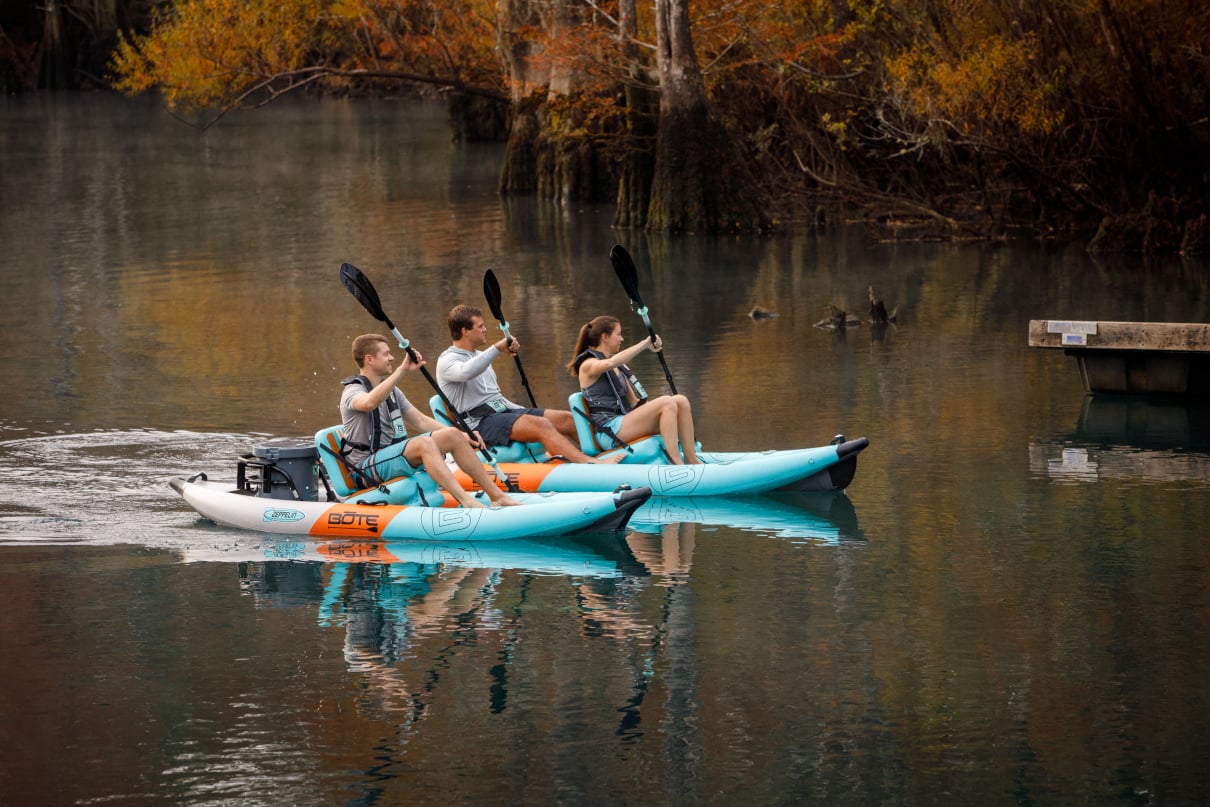
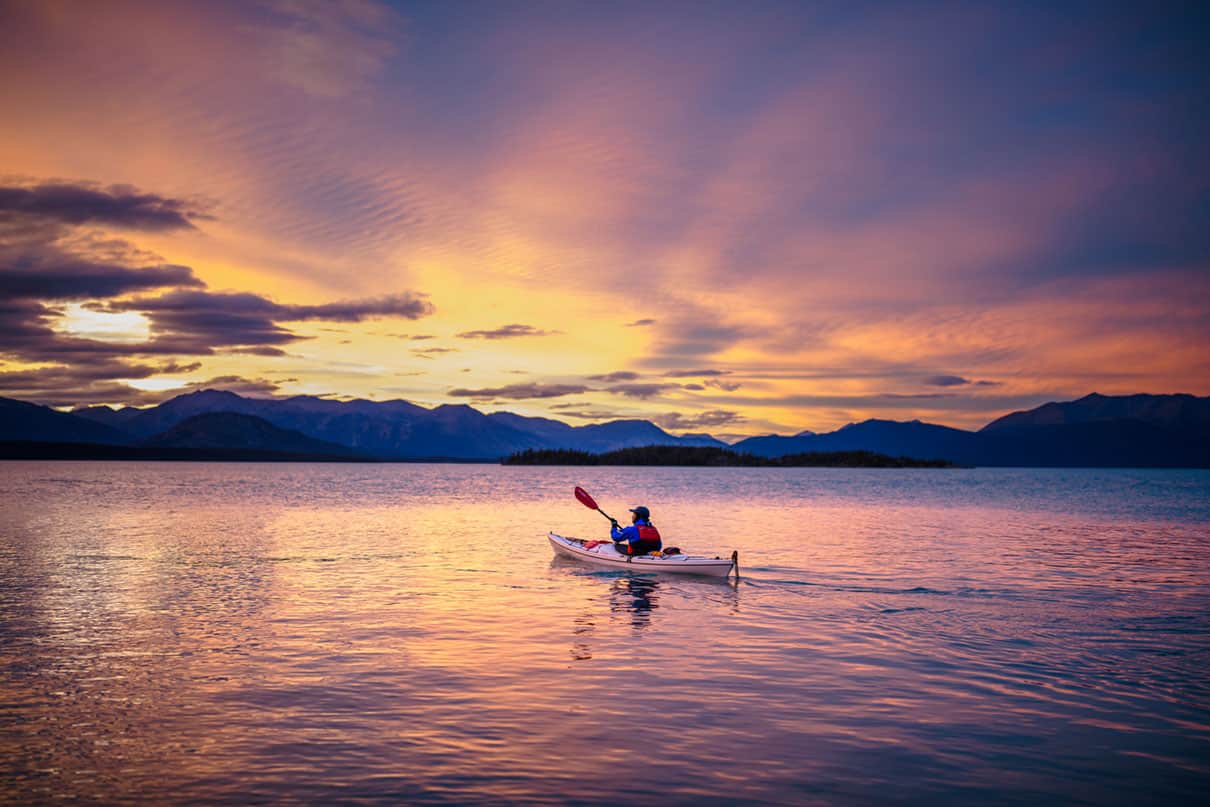
 This article was published in Issue 73 of Paddling Magazine.
This article was published in Issue 73 of Paddling Magazine. 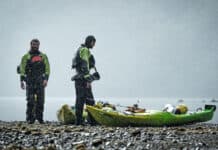
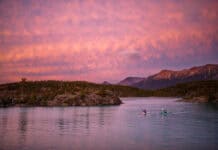

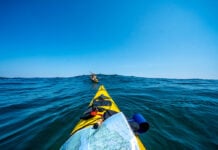
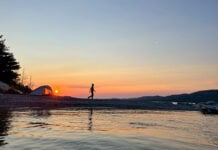


As outdoor adventure leader for over 45 years on all 7 continents, I always tell my participants that any good adventure has a moment you wish you were not there…
That’s my philosophy exactly.
You enjoy the sunshine more after a cold, wet spel!